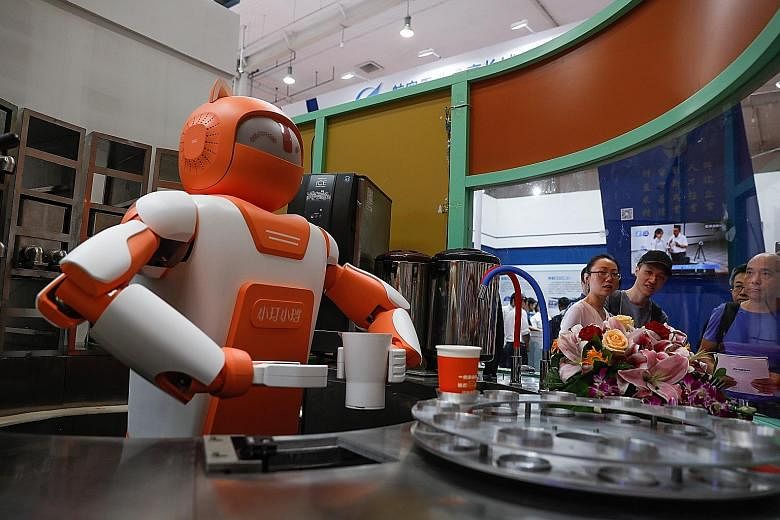China lags behind the United States in key technologies, such as artificial intelligence (AI), robotics and autonomous driving, said industry players at a business forum yesterday.
But they added that China's biggest advantage was its abundance of data and variety of scenarios where these innovations can be applied.
"When it comes to artificial intelligence, we're indeed at a weak stage, where it is merely about visual and voice technologies," said Mr Jia Zhipeng, vice-president of government affairs at Horizon Robotics, an AI chip maker.
While China and the US could be considered to be among the forerunners in this field, it still faces "a certain gap" with the US in cutting-edge theories and key technologies, he told an audience of 400 business leaders, entrepreneurs and investors during a round-table discussion at the two-day Forbes China Innovation Summit that ends today. But Mr Jia noted that there is a lot more scope for AI technologies to be applied in China.
"We have such a big market and so many people," he said, referring to China's population of nearly 1.4 billion people.
For example, AI can be used to improve urban planning, security and retail, and to inject vitality into these traditional industries.
The data collected from these different industries can, in turn, be used to help improve and advance AI technologies, he added.
Mr Tan Min, chief brand officer of UBTECH Robotics, a humanoid robotics firm, agreed that while the Chinese government and companies attach great importance to developing capabilities in this area, China's AI has yet to reach advanced levels by international standards. This is particularly so in robotics, where China had a late start compared with other countries.
However, he is glad that his Shenzhen-based start-up is in the middle of the world's largest production base, surrounded by players across the entire supply chain, both upstream and downstream.
"As researchers, we always think that we are very blessed to have this kind of support; this is one of our big advantages," he said.
Mr Shang Guobin of Baidu Intelligent Driving Group said it is a fallacy to think that China can rival the US in terms of AI, just because it has a lot of data, capital and AI talent to match.
"Frankly speaking, in China, there is a big gap compared with the United States in areas including autonomous driving," he said.
"For example, the chips that we use in autonomous driving are still basically made in the US," he added.
And the best supplier of lidar, a device which bounces lasers off objects to help autonomous cars know what is nearby, is also from the US.
"We're simply unable to bridge the gap in terms of hardware," said Mr Shang.
But he believes that China's competitive edge lies especially in helping companies bring their technologies, such as autonomous driving, to the market. Besides data, China has a large number of scenarios where these technologies can be applied, tried and tested, he added.

